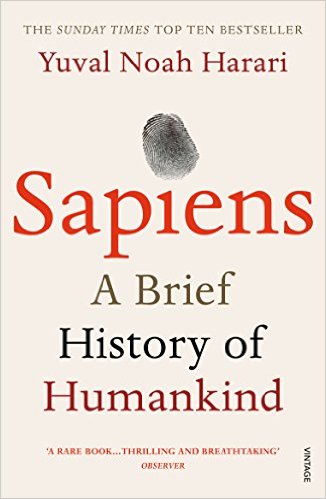 Homo sapiens rule the world because it’s the only animal that believes in things that exist purely in its own imagination, such as gods, states, money and human rights. Starting from this provocative idea, Sapiens goes on to retell the history of our species from a completely fresh perspective. It explains that money is the most pluralistic system of mutual trust ever devised; that capitalism is the most successful religion ever invented; that the treatment of animals in modern agriculture is probably the worst crime in history; and that even though we are far more powerful than our ancient ancestors, we aren’t much happier.
Homo sapiens rule the world because it’s the only animal that believes in things that exist purely in its own imagination, such as gods, states, money and human rights. Starting from this provocative idea, Sapiens goes on to retell the history of our species from a completely fresh perspective. It explains that money is the most pluralistic system of mutual trust ever devised; that capitalism is the most successful religion ever invented; that the treatment of animals in modern agriculture is probably the worst crime in history; and that even though we are far more powerful than our ancient ancestors, we aren’t much happier.
Seventy thousand years ago, there were at least six different human species on earth. They were insignificant animals, whose ecological impact was less than that of fireflies or jellyfish. Today, there is only one human species left: Us. Homo sapiens. But we rule this planet. Sapiens, the book, takes us on a breath-taking ride through our entire human history, from its evolutionary roots to the age of capitalism and genetic engineering, to uncover why we are the way we are. Sapiens focuses on key processes that shaped humankind and the world around it, such as the advent of agriculture, the creation of money, the spread of religion and the rise of the nation state. Unlike other books of its kind, Sapiens takes a multi-disciplinary approach that bridges the gaps between history, biology, philosophy and economics in a way never done before. Furthermore, taking both the macro and the micro view, Sapiens conveys not only what happened and why, but also how it felt for individuals.


